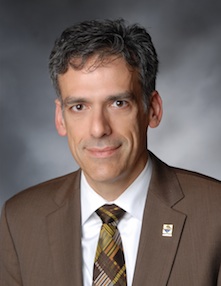By Lindsey Liles
When I discovered that the Phi Beta Kappa Visiting Scholar Program had selected the acclaimed chemist Rigoberto Hernandez to visit my university, Sewanee: The University of the South, as a student host, I admit I was a little intimidated. I sifted through my general chemistry memories, trying to dredge up some buried understanding of atoms and molecules and bonds.
I needn’t have worried about chemistry. Throughout the course of his visit, Professor Hernandez taught me an important lesson about the mission of Phi Beta Kappa and the Visiting Scholar Program. The program was established in 1956 and selects leading scholars in a wide range of fields to conduct eight to nine two-day visits to Phi Beta Kappa chapters across the country. During their campus visits, the scholars offer public lectures in their field of expertise and meet with students and faculty. It is a brief but intense exchange of ideas and traditions, and a sharing of the wide range of interests represented by Phi Beta Kappa.
In his public lecture, “Transitions and Janus Particles,” Hernandez touched upon the multi-faced nature of Janus particles, a tiny particle with differing physical properties in its different regions. However, it was not a lecture on chemistry alone; rather, he drew a parallel between the many facets of our own lives, including past and present paths, interests, and different cultures. Embodying the idea of a multi-faceted person is, fittingly, Hernandez himself.
I soon learned that he is much more than a chemist. Even his academic career is a reflection of two interests: math and physics. He says that through chemistry he unites his love of each in exploring both “the why and the how” of the questions he aims to answer in his research. At Georgia Tech, Hernandez teaches chemistry at the undergraduate and graduate level, and his sincere interest in students is clear even from his short time in Sewanee. At a small lunch with nine Sewanee undergraduates, Hernandez wasted no time in getting to know the students; before anyone went back for seconds, he learned everyone’s name, hometown, major, and outside interests.
His care for students does not stop in the classroom; Hernandez is an advocate for diversity in the sciences at schools across the country. As the director of the OXIDE (Open Chemistry Collaborative in Diversity Equity), he works to identify and break down barriers to students of diverse cultural and economic backgrounds who are entering the sciences, and chemistry in particular. The demographics of our population are not represented in the sciences, statistics that indicate to Hernandez “that there is a pool of talent we are not drawing from.” In his push for “inclusive excellence in the sciences,” Hernandez is driven to do more than talk about the problem; he holds a biennial workshop of department chairs to create applicable solutions.
Outside of the academic realm, Hernandez is a family man―he and his son practice Taekwondo together, and he makes sure to balance the demands of his academic career with family time.
During his two-day visit, Hernandez met with a wide array of faculty and administrators, including Vice Chancellor John McCardell. He had lunch and dinner with groups of undergraduate students, and went on a student-led campus tour of Sewanee. He gave two lectures―one for the general public and one specifically for chemistry majors and faculty. It is safe to say that for his short time at Sewanee, Hernandez took full part in the academic life of the university.
As for me, I felt lucky to spend so much time with such a dynamic and engaging person. Hernandez, as a professor, a proponent of diversity, a husband, a father, a chemist, and more, is not easily categorized. He is a man of diverse interests who is able to share his knowledge with scientists and non-scientists alike.
On a broader scale, he is a reflection of Phi Beta Kappa itself; though it has many faces representing different academic interests, career paths, and universities, it presents a unified whole. The Visiting Scholar Program allows an invaluable exchange of those many faces, and the Beta of Tennessee Chapter at Sewanee sincerely thanks Rigoberto Hernandez for sharing his time and ideas with our university.
Lindsey Liles is a senior English and Biology major at Sewanee: The University of the South. Sewanee is home to the Beta of Tennessee Chapter of Phi Beta Kappa.




